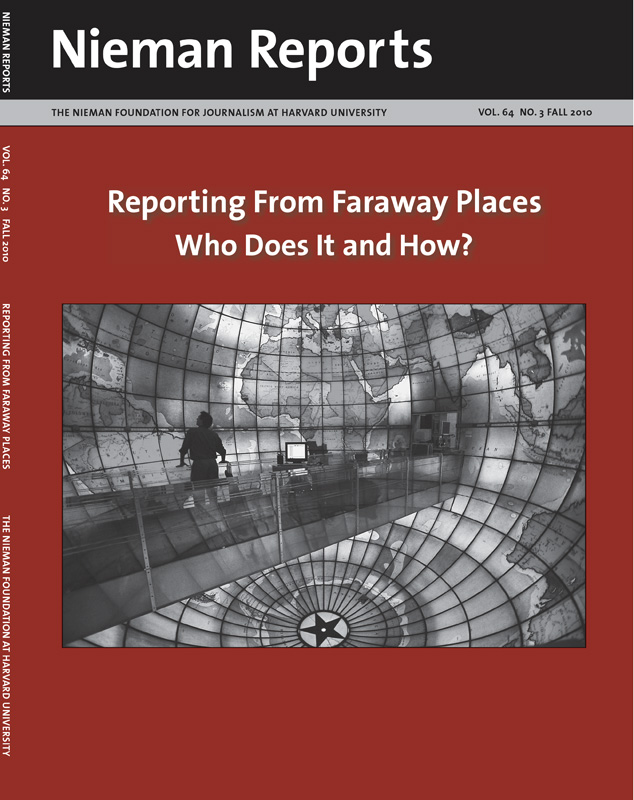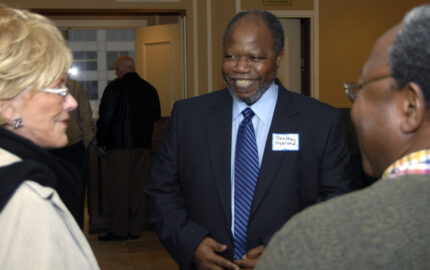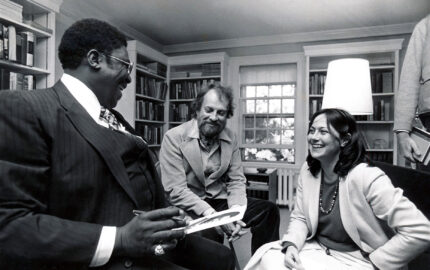A new collaboration between the Nieman Foundation and the Pulitzer Center on Crisis Reporting will support international reporting initiatives with a special focus on global health coverage.
The partnership also will bring Pulitzer Center journalists to Harvard for presentations and discussions on underreported international stories and provide an annual workshop for fellows that will explore the center’s strategies for using multimedia platforms effectively; placing news stories in the media for maximum impact; and employing social media, educational networks, and other innovative techniques to engage the public in important global issues.
The new collaboration grows out of the Nieman Foundation’s fellowship in global health reporting, which was established in 2005 and includes a four-month reporting project at the end of the Nieman year.
Once intended to provide major news outlets with funds to send fellows to the developing world to learn and report about health issues, the global health reporting fellowship has become a metaphor for the massive changes affecting journalism and international reporting in particular. Within just a few years of the program’s inception, placing these well researched, groundbreaking international health stories in mainstream media outlets has become a challenge despite the global health fellows’ journalistic experience, connections and success in learning new media skills at Harvard.
Based in Washington, D.C., the Pulitzer Center funds, promotes and publishes international reporting projects and has built a reputation as an innovator when it comes to keeping global affairs on local radar screens. In collaboration with the Nieman Foundation, the center’s staff will support global health fellows as they plan their trips and try to place their stories. The Nieman Fellows also will be part of the center’s outreach program.
The new partnership is underwritten by a three-year grant from the Pulitzer Center, which will cover the cost of fieldwork for 2011 global health fellows Antigone Barton and Helen Branswell as well as for their counterparts in the 2012 and 2013 classes.
The collaboration between our two organizations is apparent in other ways, such as this issue of Nieman Reports, with articles by Pulitzer Center director Jon Sawyer (“The Sometimes Bumpy Nonprofit Ride Into Digital Foreign Correspondence”) as well as journalists funded by the Pulitzer Center, Kwame Dawes (“Bearing Witness: The Poet as Journalist”), Jason Motlagh (“From War Zones to Life at Home: Serendipity and Partners Matter”), and Fatima Tlisova, NF ’09, (“Brutal Censorship: Targeting Russian Journalists”). Nieman Reports is serving as the publishing partner for Tlisova’s reporting about Russian journalists who have fled the country or been killed.
The partnership also will bring Pulitzer Center journalists to Harvard for presentations and discussions on underreported international stories and provide an annual workshop for fellows that will explore the center’s strategies for using multimedia platforms effectively; placing news stories in the media for maximum impact; and employing social media, educational networks, and other innovative techniques to engage the public in important global issues.
The new collaboration grows out of the Nieman Foundation’s fellowship in global health reporting, which was established in 2005 and includes a four-month reporting project at the end of the Nieman year.
Once intended to provide major news outlets with funds to send fellows to the developing world to learn and report about health issues, the global health reporting fellowship has become a metaphor for the massive changes affecting journalism and international reporting in particular. Within just a few years of the program’s inception, placing these well researched, groundbreaking international health stories in mainstream media outlets has become a challenge despite the global health fellows’ journalistic experience, connections and success in learning new media skills at Harvard.
Based in Washington, D.C., the Pulitzer Center funds, promotes and publishes international reporting projects and has built a reputation as an innovator when it comes to keeping global affairs on local radar screens. In collaboration with the Nieman Foundation, the center’s staff will support global health fellows as they plan their trips and try to place their stories. The Nieman Fellows also will be part of the center’s outreach program.
The new partnership is underwritten by a three-year grant from the Pulitzer Center, which will cover the cost of fieldwork for 2011 global health fellows Antigone Barton and Helen Branswell as well as for their counterparts in the 2012 and 2013 classes.
The collaboration between our two organizations is apparent in other ways, such as this issue of Nieman Reports, with articles by Pulitzer Center director Jon Sawyer (“The Sometimes Bumpy Nonprofit Ride Into Digital Foreign Correspondence”) as well as journalists funded by the Pulitzer Center, Kwame Dawes (“Bearing Witness: The Poet as Journalist”), Jason Motlagh (“From War Zones to Life at Home: Serendipity and Partners Matter”), and Fatima Tlisova, NF ’09, (“Brutal Censorship: Targeting Russian Journalists”). Nieman Reports is serving as the publishing partner for Tlisova’s reporting about Russian journalists who have fled the country or been killed.



